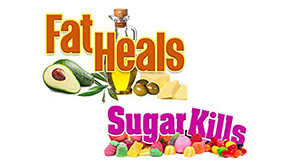by Lance D. Reedy
Starting in 1981 I became very interested in diet and nutrition. The first major book I read about this subject was The Pritikin Permanent Weight-loss Manual by Nathan Pritikin.
Pritikin advocated an extremely low-fat diet with fat being about 10% on one’s caloric intake. He was also a strong proponent of consuming complex carbohydrates. Refined sugar and white flour were also verboten in his diet scheme.
Pritikin’s contention, and he is spot on here, is that refined carbohydrates such as sugar and white flour concentrate the calories in one’s diet. Refining wheat into white flour removes the bran and wheat germ, leaving just the starch, or white flour.
Drinking fruit juice does the exact same thing. An 8-ounce glass of apple juice contains about the same number of calories as two, medium sized apples. One can down the eight ounces of apple juice in a few seconds, but it takes a while to chew up and swallow two apples. The concentrating of carbohydrates elevates your blood sugar much faster causing your body to go into overdrive to bring it down.
Dr. Stephen Sinatra in his book, The Great Cholesterol Myth, posed this question in chapter 5, The Truth about Fat, It’s Not What You Think, “If we need an adequate amount of healthy fats in our diet, why then, did the Pritikin ultra-low-fat diet still work to reduce people’s heart disease?” Sinatra’s answer was that the Pritikin diet cut out refined sugar.
In every worthwhile book I have read about diet and nutrition there is one over-riding theme. Excess sugar consumption is really bad for your health. Added to this mix is high fructose corn syrup (HFCS), which is nothing more than sugar derived from corn. These concentrated sugars can be from fruit juice and even dried fruit. A handful of raisins contains much more sugar than a handful of grapes. In 2019, I reviewed the first nine chapters of Dr. Robert Lustig’s The Hacking of the American Mind. Chapter 9 is titled What You Eat in Private you Wear in Public. Let’s look at some excerpts from my review of that chapter.
SORF is my acronym for the trifecta of…
Sugar
Oils, meaning those manufactured from seeds
Refined
Flour
“Okay, sugar is a problem; I get that, but I thought some of these oils, like canola oil, are heart healthy,” you may think. Dr. Sinatra enumerated in his book four chief causes of heart disease. Here they are:
Sugar—Inflammation—Oxidation–Stress
Because of the way these seed oils (incorrectly called vegetable oils) are manufactured, they are already oxidized when they are filled into their plastic bottles. These oxidized oils contribute to transforming the harmless and light, fluffy low-density lipo-proteins into bad cholesterol.
This bad cholesterol, in turn, causes inflammation of the endothelial cells that line our coronary arteries. The low-density lipo-proteins are just fine, and nature made them that way for a purpose. However, if they get transformed due to a faulty diet, they are still not the culprit. The culprit lies in what contaminated them—oils derived from seeds. These are soybean oil, canola oil, cottonseed oil, etc.
To further explore the problems with these edible oils, please refer to this article titled The Great Con-ola from the Weston A. Price Foundation’s website. Another excellent article is titled Good Fats, Bad Fats: Separating Fact from Fiction.
There is also a potential link with the ever-increasing consumption of these seed oils and skin cancer and even perhaps cancer in general. Please review this article titled Fats and Oils and Their Impact on Health, again from the Weston A. Price Foundation’s website.
One of the key points Dr. Lustig makes in book, The Hacking of the American Mind, is that seed oils (soybean, canola, cottonseed, etc.), which are high in omega-6 fatty acids, inhibits your natural serotonin production. Inadequate amounts of serotonin lead to anxiety and depression.
In contrast, omega-3 fatty acids, found in fish, eggs, olive oil, and other healthy fats, contribute to the normal production of the neurotransmitter, serotonin. Serotonin is responsible for creating a sense wellbeing, mental equilibrium, and contentedness.
I seek to avoid consuming food items made with these damaging seed oils. For example, I was given a package of nuts that were roasted in either soybean, canola, or cottonseed oil. While I appreciated the gesture, I had to toss them. Likewise, I avoid salad dressings, margarine, and other food products made with these unhealthy oils.
There are further problems with the seed oils being genetically modified and doused with herbicides such as Roundup. A detailed discussion of this issue is beyond to scope of this article.
Lastly, what about refined flours? Once you strip away the germ and bran from grains, you are left with the starch or pure carbohydrate from the grain seed. It’s a straight repeat of the problems with sugar. If a pastry is made from sugar, refined flour, and seed oils, you now have a triple whammy.
Conclusion: Some people will object and say that they will have nothing left to eat if they remove SORF from their diet. Nothing could be further from the truth. In future articles we’ll explore incredibly tasty foods that are SORF free. End

